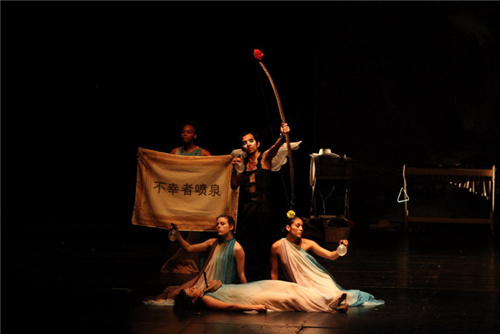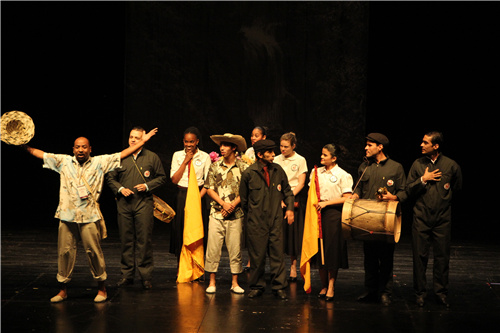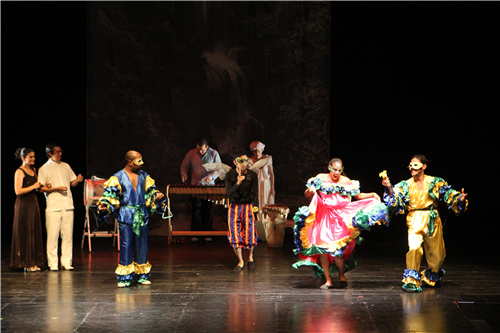
Director: Alejandro Gonzalez Puche, Ma Zhenghong
Playwright: Juan del Encina
Institution: Universidad del Valle, Colombia
Venue: North Theatre
Time: 14:00, May 22, 2012
Event: The 2nd Asian Theatre Schools Festival

Director’s Notes
The Egloga de Placida & Vitoriano (1513) presupposes a culmination point in the dramatic work of Juan del Encina. The story keeps the characteristics of the classic fable of unfortunate lovers, innocent victims of misunderstandings that lead them to suicide, such as Pyramus and Thisbe, using the fantastic resource of the dagger stabbed right into the heart. However, in this Eclogue surprises the Skull with which Encina introduces a variety of scenes and settings that give to the play a lot of dynamism, such as characters from the celestinestic world, rustic shepherds of previous works and the direct intervention of the gods to amend the mischiefs caused by Cupid. The principal characters have some psychological contradictions that justify their decisions and make possible a varied and perspective action.
This work was rediscovered by Federico Garcia Lorca and was staged by his group La Barraca throughout the Spanish territory. As them, the Univalle Scenic Laboratory, with support from Accion Cultural de Espana, made in 2011 a tour for 29 Spanish cities and presented the play at major festivals, like the OLITE CLASSICAL THEATRE FESTIVAL and the closing day of ALMAGRO CLASSICAL THEATRE FESTIVAL.

Synopsis
Gil Cestero and Pascual, a pair of shepherds responsible for introducing the show, are expecting a company of comedians. Suddenly, music and noise: the group of young actors arrives, reminding students of La Barraca de Lorca: they distribute the scenery take out the costumes and masks and get musical instruments tuned. Full of joy, Gil Cestero, by revealing the plot of the play, importunate the comedians, however, before they can stop him, he begins the representation: Vitoriano, Placida and their friends have to dance the quadrille, but there is a small disagreement and Vitoriano abandons his beloved. Placida is enmeshed in feelings: she calls a bunch of comedians, an old matchmaker, and, finally, in the absence of Vitoriano, decides to leave the city heading for the dangerous woods
Next, Vitoriano appears with his friends, devoted to hawking, rather he cannot concentrate, and regrets his non stopping thinking about Placida. To find a remedy, he turns to his friend, Suplicio, who claims he can put him out of the prison of love: his is the philosophy "one nail drives out another nail," and takes Vitoriano to Flugencia's brothels. The main conflict is exposed in this scene, reflected in the internal struggle between the carnal passion and the ideal or platonic love. In the end, Flugencia and Vitoriano arrange a meeting. At that time appears Eritea, old matchmaker, inspired in La Celestina, who causes the getaway of the lover; thereupon, she repairs the battered body of Flugencia, leaving her in working conditions. When Eritea exits the scene, Vitoriano yields to the temptations of the flesh.
Meanwhile, Suplicio is waiting for his friend at Cupid's Bar; Vitoriano comes sorry,as his unrequited love, instead of shutting down, revive fiercely. Seeing no way out, Suplicio recommends him to return to the embrace of his beloved, and so he does. However, Placida is not found in her home, and Vitoriano hear from a shepherd that she has fled to the rugged mountains. The friends go in search of the beloved. The urban environment becomes rural. They meet Gil Cestero and Pascual, who give them reasons for the missing Placida. Pascual, once alone on stage, sings an alaba'o against the god Cupid. Then, Placida appears, wandering through the woods, and after weighing their shame, determined to commit suicide with a knife given by Vitoriano,in a fountain.
Suplicio and Vitoriano finally meet with fate: they discover the lifeless body of the girl. Vitoriano, identifying the dagger, declares him guilty and decides to end his life;but Suplicio calms down his friend and suggest him to pray. Vitoriano, in a moment of composure, sings a profane worship, the invitatorium, where requested to Cupid for his beloved, but the god of love does not listen.
Then, the lover evokes Venus, threatening the goddess with his death. Venus emerges from the fountain and put in rest the desperate lover, getting his consciousness away Thereupon, Venus calls in the aid of her brother Mercury, who appears, invokes the fates and raises Placida. When Vitoriano recovers consciousness, is reunited with his beloved, who tells him what she saw in the afterlife. Both come in search of Suplicio, who, meanwhile, has sought the help of Gil Cestero and Pascual. When the pastors and the friend discover that the woman that everyone takes for dead is alive, panic arises; but then, almost instantly, joy gets everyone heart. The show ends with dances for the return to life of Placida.

